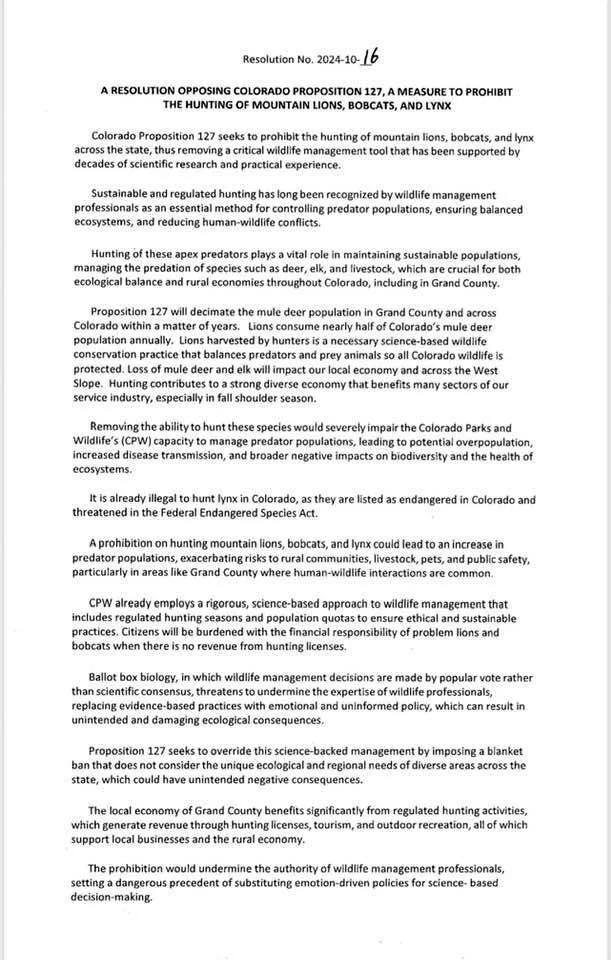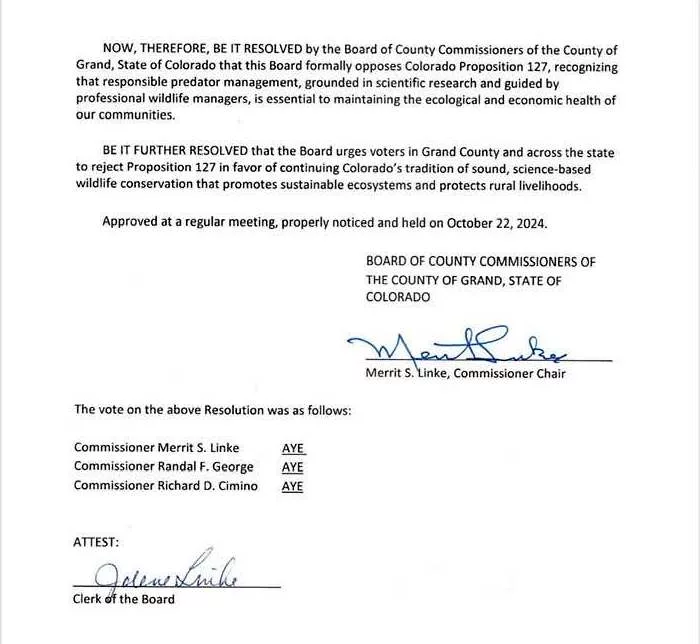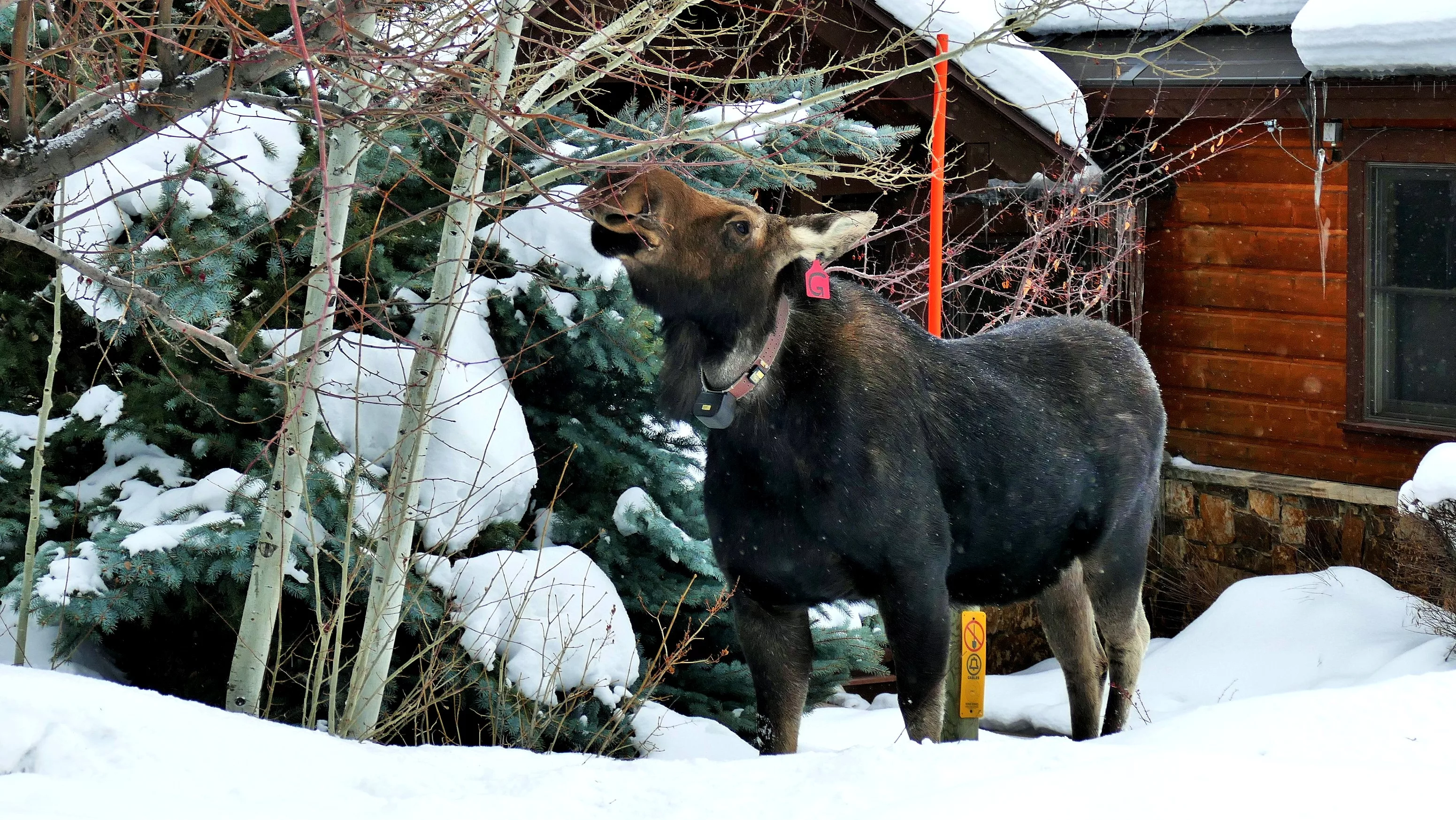
By Shannon Lukens.
Colorado Wildlife Employees Protective Association issues Resolution
Employees of Colorado Parks and Wildlife, who are members of the Colorado Wildlife Employees Protective Association, or CWEPA, have taken a stance on so-called Ballot Box Biology. That is like Proposition 114 that allowed the reintroduction of wolves because of a statewide vote. And Proposition 127 on the current ballot which would prohibit the hunting of mountain lions, bobcats, and lynx. It’s also a statewide vote, of which many rural residents are opposed.
The group has passed a resolution in favor of science-based wildlife conservation and not voting statewide. “CWEPA members are united in their belief that Colorado’s wildlife is best protected, managed and enhanced by the highly skilled wildlife management professionals employed by the state, who follow a science-driven approach to their work.”
Lauren Truitt is a former employee with Colorado Parks and Wildlife, as the Assistant Director for Education and Information. She is now with CWEPA. She said this is the first resolution the group has ever done.
“The CWEPA resolution is intentionally broad because they want this to apply to all circumstances. They are looking at the impact of Proposition 114, which was the reintroduction of wolves, and now you have Proposition 127, the proposed ban of mountain lion hunting, bobcat hunting and lynx hunting in Colorado. So although this current moment in time with the ballot initiative really did prompt the association to take action. They wanted it to be broad so Coloradans to understand that as the professionals, the people on the ground managing Colorado’s wildlife, they want this to be a resounding statement that they believe in science-backed wildlife management. So it is really an important message to get out to Coloradans. The agency cannot speak when there is an active ballot measure, but the employee association under some of the unionization in Colorado, they are able to at least put out a statement saying that this is what they believe.”
Truitt says the association has about 200 active employees throughout the state. This includes wildlife officers, biologists, wildlife technicians, aquatics staff, administrative assistants and education and outreach personnel.
“From Northwest Colorado to southeastern Colorado, every county, every community has CPW staff members living and working in it. So this really covers the entire state and the importance of their work.”
Press Release; October 14, 2024
Colorado Wildlife Employees Protective Association (CWEPA) Passes Resolution Supporting Science-Based Wildlife Conservation
Denver, Colo. — The Colorado Wildlife Employees Protective Association (CWEPA), representing over 200 dedicated members, announces the passage of its first resolution in support of science-based wildlife conservation aligned with the mission of Colorado Parks and Wildlife (CPW) and the principles of the North American Model of Wildlife Conservation.
CWEPA, founded in 1947, is composed of wildlife officers, biologists, wildlife technicians, aquatics staff, administrative assistants and education and outreach personnel who are deeply committed to the conservation and management of Colorado’s diverse wildlife resources. This resolution reaffirms CWEPA’s mission to advance the ability of employees to safeguard the wildlife resources of Colorado for the benefit of all residents and visitors.
“Science-based wildlife management is the foundation of everything we do,” said Casey Westbrook, President of CWEPA. “Colorado’s wildlife story is written because of our membership, and those who have come before us, have devoted our careers to following the best available research and proven wildlife management strategies. Keeping management authority with wildlife managers is key to protecting Colorado’s wildlife for future generations.”
This resolution comes as part of CWEPA’s ongoing efforts to uphold the guiding policies set forth by Colorado Revised Statute 33-1-101(1), which mandates the protection, preservation, and management of wildlife for the use and enjoyment of all citizens. Through their tireless work, CWEPA members have ensured the continuation of over 125 years of professional wildlife management, aimed at perpetuating both game and nongame species and fostering public appreciation for Colorado’s unique wildlife.
The resolution further recognizes the vital role that the Colorado Legislature and the CPW Commission play in providing a fair and equitable process for the public to engage in wildlife management decisions. It also highlights the important contributions of hunting and fishing to wildlife management efforts, as defined by Colorado Revised Statutes 33-1-101(4) and 33-1-104(2), alongside other sustainable practices guided by multiple-use management principles.
CWEPA members are united in their belief that Colorado’s wildlife is best protected, managed and enhanced by the highly skilled wildlife management professionals employed by the state, who follow a science-driven approach to their work.
For more information on CWEPA and its commitment to wildlife conservation, please visit https://www.coloradowepa.org/
About CWEPA
The Colorado Wildlife Employees Protective Association (CWEPA) was founded in 1947 to represent the employees of Colorado Parks and Wildlife who work tirelessly to conserve and manage Colorado’s wildlife. CWEPA advocates for the protection of wildlife resources through professional, science-based wildlife management practices and policies.
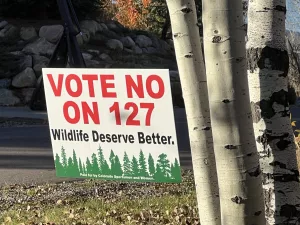
More on Proposition 227
The Fence Post publication reports on former CPW Commissioners
The Fence Post is reporting that 24 former Colorado Parks and Wildlife Commissioners are “urging voters to reject a measure seeking to ban mountain lion and bobcat hunting in the state.”
From the article: “Former CPW commissioners opposing the banning of mountain lion, bobcat, and lynx hunting are Alex Zipp, Brad Coors, Brad Phelps, Charlie Garcia, Chris Castilian, Claire O’Neal, Dale Pizel, Dean Wingfield, Dick Ray, Duke Phillips, Gaspar Perricone, George VanDenBerg, Jeanne Horne, Jeff Crawford, Jim Vigil, John Howard, John Singletary, Ken Torres, Mark Smith, Marvin McDaniel, Michelle Zimmerman, Rick Enstrom, Robert Bray, and Tom Burke.”
Former CPW Commissioners urge against lion hunting ban by Rachel Gabel
Grand County Commissioners write a resolution in opposition
Grand County Commissioners have come out as opposed to Ballot Box Biology and Proposition 127. “The Grand County BOCC urges Grand County voters and those across the state to reject Proposition 127 in favor of continuing Colorado’s tradition of sound, science-based wildlife conservation that promotes sustainable ecosystems and protects rural livelihoods.”
Here is that resolution: Resolution No. 2024-lo-16 (Copy is below)
A RESOLUTION OPPOSING COLORADO PROPOSITION 127, A MEASURE TO PROHIBIT THE HUNTING OF MOUNTAIN LIONS, BOBCATS, AND LYNX
Colorado Proposition 127 seeks to prohibit the hunting of mountain lions, bobcats, and lynx across the state, thus removing a critical wildlife management tool that has been supported by decades of scientific research and practical experience.
Sustainable and regulated hunting has long been recognized by wildlife management professionals as an essential method for controlling predator populations, ensuring balanced ecosystems, and reducing human-wildlife conflicts.
Hunting of these apex predators plays a vital role in maintaining sustainable populations, managing the predation of species such as deer, elk, and livestock, which are crucial for both ecological balance and rural economies throughout Colorado, including in Grand County.
Proposition 127 will decimate the mule deer population in Grand County and across Colorado within a matter of years. Lions consume nearly half of Colorado’s mule deer population annually. Lions harvested by hunters is a necessary science-based wildlife conservation practice that balances predators and prey animals so all Colorado wildlife is protected. Loss of mule deer and elk will impact our local economy and across the West Slope. Hunting contributes to a strong diverse economy that benefits many sectors of our service industry, especially in fall shoulder season.
Removing the ability to hunt these species would severely impair the Colorado Parks and Wildlife’s (CPW) capacity to manage predator populations, leading to potential overpopulation, increased disease transmission, and broader negative impacts on biodiversity and the health of ecosystems.
It is already illegal to hunt lynx in Colorado, as they are listed as endangered in Colorado and threatened in the Federal Endangered Species Act.
A prohibition on hunting mountain lions, bobcats, and lynx could lead to an increase in predator populations, exacerbating risks to rural communities, livestock, pets, and public safety, particularly in areas like Grand County where human-wildlife interactions are common.
CPW already employs a rigorous, science-based approach to wildlife management that includes regulated hunting seasons and population quotas to ensure ethical and sustainable practices. Citizens will be burdened with the financial responsibility of problem lions and bobcats when there is no revenue from hunting licenses.
Ballot box biology, in which wildlife management decisions are made by popular vote rather than scientific consensus, threatens to undermine the expertise of wildlife professionals, replacing evidence-based practices with emotional and uninformed policy, which can result in unintended and damaging ecological consequences.
Proposition 127 seeks to override this science-backed management by imposing a blanket ban that does not consider the unique ecological and regional needs of diverse areas across the state, which could have unintended negative consequences.
The local economy of Grand County benefits significantly from regulated hunting activities, which generate revenue through hunting licenses, tourism, and outdoor recreation, all of which support local businesses and the rural economy.
The prohibition would undermine the authority of wildlife management professionals, setting a dangerous precedent of substituting emotion-driven policies for science- based decision-making.
NOW, THEREFORE, BE IT RESOLVED by the Board of County Commissioners of the County of Grand, State of Colorado that this Board formally opposes Colorado Proposition 127, recognizing that responsible predator management, grounded in scientific research and guided by professional wildlife managers, is essential to maintaining the ecological and economic health of our communities.
BE IT FURTHER RESOLVED that the Board urges voters in Grand County and across the state to reject Proposition 127 in favor of continuing Colorado’s tradition of sound, science-based wildlife conservation that promotes sustainable ecosystems and protects rural livelihoods.
Approved at a regular meeting, properly noticed and held on October 22, 2024.
BOARD OF COUNTY COMMISSIONERS OF THE COUNTY OF GRAND, STATE OF COLORADO
Merrit S. Linke, Commissioner Chair
The vote on the above Resolution was as follows:
Commissioner Merrit S. Linke AYE
Commissioner Randal F. George AYE
Commissioner Richard D. Cimino AYE
Two CPW Commissioners write opinion article in favor of Proposition 127
Two current Colorado Parks and Wildlife commissioners, Jack Murphy and Jessica Beaulieu, wrote an opinion piece in the Durango Herald.
Proposition 127 protects Colorado’s majestic mountain lions and bobcats.
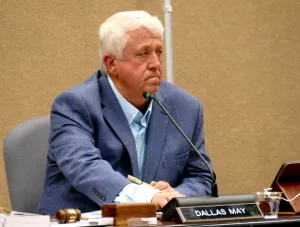
At the October meeting of the Colorado Parks and Wildlife Commission, Chairman Dallas May said several times that commission members do not talk outsider of the regular meetings. Chairman May provided this statement about the opinion piece in the Durango Herald by two current commissioners.
“I am the current Chair of the Colorado Parks and Wildlife Commission and have served on the Commission since 2020. I’m writing to clarify that recent op-eds written by current CPW Commissioners – regarding Proposition 127: Prohibit Bobcat, Lynx, and Mountain Lion Hunting – reflect their personal views and not those of the entire thirteen-member Commission. The Commission, as a whole, has not taken any position on Proposition 127.”
Dallas May, Chair
Colorado Parks and Wildlife Commission
Article from The Durango Herald
Proposition 127 protects Colorado’s majestic mountain lions and bobcats
By Jack Murphy, Jessica Beaulieu and James Pribyl
Saturday, Oct 12, 2024 10:09 AM Updated Wednesday, Oct. 16, 2024 5:58 PM
We are current and former Colorado Parks and Wildlife commissioners, which is the body that sets wildlife policy, including a former chair, and we encourage a “yes” vote on Proposition 127.
Proposition 127 simply protects Colorado’s majestic mountain lions and bobcats from highly unpopular, unscientific and unwarranted abuse and exploitation that in no way contributes to our bright future of ethical outdoor recreation in our great state of Colorado.
Wild cats are hunted by dogs, not humans. The pack is set loose in nature, tracked by phone app, often aided by drones. It’s a long, raucous and terrorizing attack on unoffending native animals, which seek safety up a tree. It resembles the canned hunt as wildlife has nowhere to run, no chance to survive.
A small lion-hunting industry promotes capturing the prize, the trophy Tom, guaranteeing success at 100%.
This permissive environment for killing wild cats – animals not involved in any human conflict – sharply contrasts with Colorado’s devotion to ethical hunting principles including fair chase.
Bobcats are baited with the smell of sardines or oily cat food in cages across the remote wilderness, exposed to brutal sub-zero winter weather. Held daytime and nightfall, animals suffer from stress. The trapper arrives to choke the caged animal slowly to death not to bloody their pelt prized for spots similar to the leopard.
Trappers sell fur at auction, the first stop along luxury fur market sales to China. This is not hunting, but commodification of wildlife driven by market prices.
Proposition 127 allows voters to recognize not all hunting is defensible, and these are indefensible state-sanctioned acts of cruelty.
It’s time for change because we’re doing much more harm than good.
Nearly half of lions killed every year for recreation are females. Trophy hunters are asked to look for kittens, but that cannot work, because mothers leave their most vulnerable young behind in the den when going out to find food.
Abundant moral and welfare concerns deserve serious attention. Dismiss them, and we endanger our humanity in favor of rapid technology that grants unfair advantage, disrespecting both native wildlife and our ethical hunting traditions.
Proposition 127 reminds us of 30 years ago, when Colorado Division of Wildlife bear biologist, Tom Beck, an avid hunter, spoke out in support of Amendment 10, approved by voters to protect bears from baiting with doughnuts slathered with bacon grease, from chasing them with dogs to then be shot, which also orphaned cubs.
Beck was attacked mercilessly by extreme special interests for doing the right thing for wildlife and for Colorado. He had no support from commissioners. His boss, Bruce Gill, was similarly attacked for good research showing what’s known as fact today: You cannot kill lions to solve declining deer. It does not work. CPW concluded this again in a presentation of a six-year study just last year.
We’re proud to carry Beck’s legacy, understanding that we can support most hunting, but not all hunting, and it’s important to see the difference when the loudest extreme voices want nothing to change.
We must, and we can vote “yes.” As we choose to kill apex predators for recreation, it blinds us from investing in lions as the unique biodiversity boon they are in helping prey animals maintain or increase their population numbers.
Lions not only selectively target mule deer infected with Chronic Wasting Disease, but are equipped with a gut to remove CWD from the environment. CWD is the most serious risk to the future of hunting today, infecting 42 out of 51 deer herds and 17 of 42 elk herds of Colorado.
To be clear, CPW offers mountain lion hunting to serve mountain lion hunters alone, for a recreational opportunity. Fur trapping brings trappers personal profit.
There is no research, no evidence to suggest that the recreational hunting of wild cats brings any public benefit or solves any problem. It’s not managing populations, wildlife, public safety or conflict. As a science-backed agency, we are held to a higher standard and one of science, not mere opinion and conjecture.
There is evidence allowing lion hunting is increasing human-lion conflict, as studies inform that complaints and livestock depredations “were most strongly associated” with lion hunting and drastically increased from 36% to 240%.
Proposition 127 is based on not a little, but more than a half-century of the best science as evidence for commissioners to confidently tell the voters that lion populations will stabilize, not increase, without hunting. In California, without lion hunting, populations are stable, not increasing, and at the same level as they are here in Colorado.
Please join us in voting “yes” for Proposition 127.
Jack Murphy and Jessica Beaulieu are current Colorado Parks and Wildlife commissioners representing Outdoor Recreation and State Parks Utilization. James Pribyl served as former member of the Colorado State Parks Board, Greater Outdoor Colorado Trust Fund, and as chair of the Parks and Wildlife Commission. This op-ed written by Murphy, Beaulieu and Pribyl reflects their personal views and not those of the entire thirteen-member Commission. The Commission, as a whole, has not taken any position on Proposition 127.
